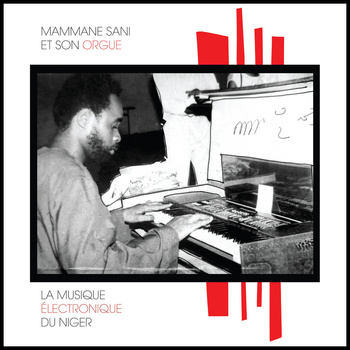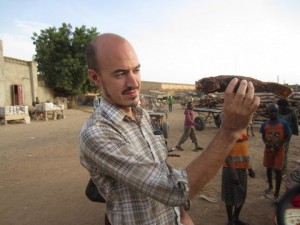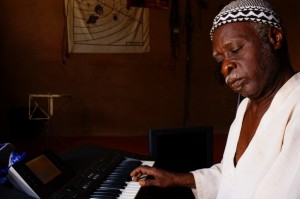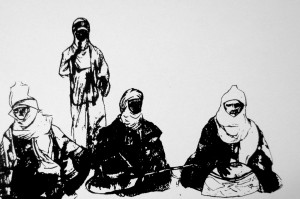Sahel Sounds showcase w/ MAMMANE SANI (ng) + Christopher Kirkley (usa) & REBEL UP! DJs
Doors open: 00:00
Showtime: 20:30
Damage: €5
Rebel Up! Soundclash & OCCII present: Sahel Sounds showcase, hosted by label boss Christopher Kirkley.
Sahel Sounds
Is a more than special label of field and studio recordings of tradional and modern popular music straight from the African Sahel, headed by American musicologist Christoper Kirkley. It all started as a cultblog named *Music From Saharan Cell Phones* where local folk and pop music was collected on sim cards and USB sticks, which is the main source of hand-to-ear music distribution in the Sub Saharan region. Since then the Sahel Sounds project has unfolded as a label that has steadily been releasing unknown artistis and bands from the Sahel region with a website that goes far beyond any typical label with road trip stories, free musical uploads and background info.
http://sahelsounds.com/
very special live show by Mammane Sani (NG)
*his very first European tour*
Mammane Sani Abdullaye is a legendary name amongst Niger’s avant garde. A pioneer of early West African electronic music, for over 30 years his instrumentals have filled the airwaves. The instrumental background drones of radio broadcasts and instrumental segue ways of TV intermissions borrow heavily from his repertoire. The dreamy organ instrumentals drift by sans comment, yet are known to all. Mammane first found the organ in 1974 as at the time he worked as a UN representative in Africa and bought it from a Rwandese colleague. Mammane’s composes in technique that can only be called minimal, relying on the simplicity and space. It is a remarkable manipulation of sound that uses the silence to invoke the emptiness – a metaphoric desert soundscape. Unsurprisingly, his source material is folkloric Nigerien music, and many of the compositions on this record are reproductions of ancient songs brought into the modern age. Interpreting this rich and varied history of Niger’s dance and song for the first time in contemporary musics, Mammane electrifies the nomadic drum of the tende, the polyphonic ballads of the Woddaabe, and the pastoral hymns of the Sahelian herders. Accompany this repertoire are a few compositions, such as Salamatu, the deeply personal love letter to an unrequited romance. His sound can very much be compared to the contemporary works of fellow African composers Francis Bebey and William Onyeabor, and on a western level Terry Riley and Kraftwerk are never far away.
His first and only album was recorded in 1978. Mammane stepped into the studio of the National Radio with his organ, where it was transposed and overdubbed in two takes. In coordination with the Minister of Culture, the album was released in a limited series of cassettes showcasing modern Niger music. The cassette project unfortunately did not progress as planned, and merely a handful were released. Today his cassettes are rare objects, highly sought by fine art connoisseurs and experimental music collectors in Niamey.
http://
Rebel Up! dj’s will be supporting this showcase with their own personal selections of Saharan, Sahel and other African sounds.
This first European tour by Mammane Sani has been made possible by the support of Le Guess Who? Festival in Utrecht.
Sahel Sounds
Mammane Sani
Mammane Sani Abdullaye is a legendary name amongst Niger’s avant garde. A pioneer of early West African electronic music, for over 30 years his instrumentals have filled the airwaves. The instrumental background drones of radio broadcasts and instrumental segue ways of TV intermissions borrow heavily from his repertoire. The dreamy organ instrumentals drift by sans comment, yet are known to all.
Mammane first found the organ in 1974.
Mammane’s composes in technique that can only be called minimal, relying on the simplicity and space. It is a remarkable manipulation of sound that uses the silence to invoke the emptiness – a metaphoric desert soundscape. Unsurprisingly, his source material is folkloric Nigerien music, and many of the compositions on this record are reproductions of ancient songs brought into the modern age. Interpreting this rich and varied history of Niger’s dance and song for the first time in contemporary musics, Mammane electrifies the nomadic drum of the tende, the polyphonic ballads of the Woddaabe, and the pastoral hymns of the Sahelian herders. Accompany this repertoire are a few compositions, such as Salamatu, the deeply personal love letter to an unrequited romance.
His first and only album was recorded in 1978. Mammane stepped into the studio of the National Radio with his organ, where it was transposed and overdubbed in two takes. In coordination with the Minister of Culture, the album was released in a limited series of cassettes showcasing modern Niger music. The cassette project unfortunately did not progress as planned, and merely a handful were released. Today his cassettes are rare objects, highly sought by fine art connoisseurs and experimental music collectors in Niamey.


For some time now, Chris Kirkley (who runs the must-read Sahel Sounds Blog) has been responsible for bringing some truly amazing music to the ears of the western world. Exploring the musical zones that lie in the jagged interstices between technology, youth, folk culture, and the ever-mutating impact of globalization, the blog (and label) drop music that offers a head-spinning take on the basic possibilities of how music is produced, consumed, and understood.
In a strange way, the music (and website) can have an effect that isn’t all too different from the very best science fiction, questioning our own society through the exploration of alternative forms of organization. By depicting a set of technologically mediated cultural products that move and function in in a way that is entirely (or at least mostly) different from what currently holds sway in the west, the blog opens up a realm of radical possibilities and potential futures. and, of course, a kingdom of some truly amazing soundscapes.
Okay- enough of all that. The reason for this is the release of “Autotune the World,” a sick new tape of crazy desert-guitar-techno-pop jams. Don’t believe that description? You can listen, or download, the tape HERE. Or you can support good music, and order it from Mississippi records.
You can also HEAR more of Chris in our latest show “Nollywood: Nigeria’s Mirror,” where he discusses the Hausa film music of that nation’s Muslim north.
http://www.afropop.org/wp/4854/another-report-from-the-alternate-future/




